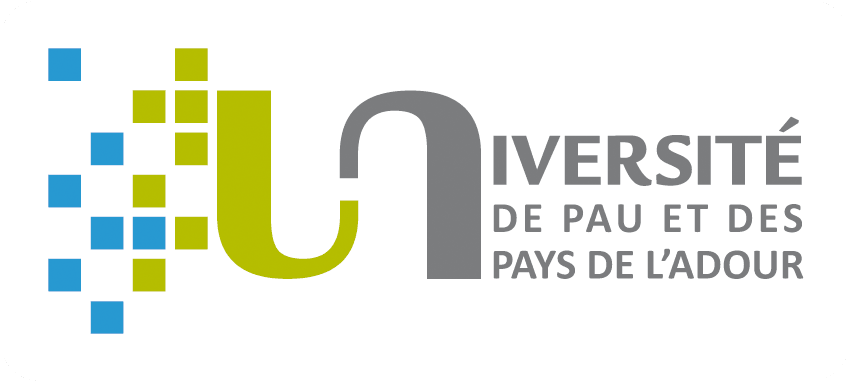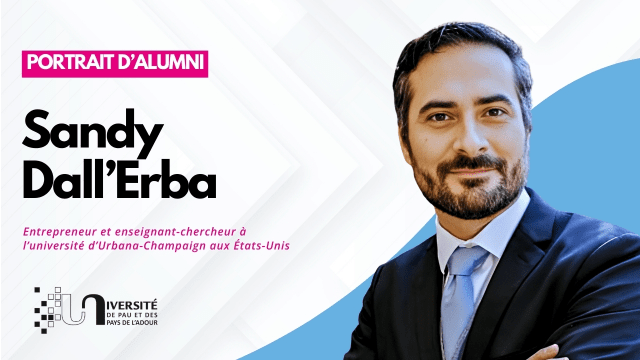Sandy Dall’Erba, a lecturer-researcher at the University of Illinois Urbana-Champaign (United States)
“The Erasmus programme was decisive in my curriculum.”
At the UPPA, Sandy Dall’Erba confirmed his three passions: economics, research, and the international scene. An equation that resulted in a PhD in international economics and a career as a lecturer-researcher in the United States. In 2021, he created Greener Impacts, a company specialised in economic and environmental impact studies.
Can you tell us about your time at the UPPA?
I arrived at the UPPA in 1996 after a first year in economics at the Panthéon Sorbonne University in Paris. My parents were moving to the Landes so I looked for the university nearest to them, which was Pau. In the end, it was a very positive choice, as the UPPA opened many doors for me and was really flexible throughout my curriculum. I was able to do my Bachelor’s at Aachen as part of the Erasmus programme. Most candidates were interested in Spain, and I was the only one in my class who wanted to go to Germany. I continued with a Master’s and an M.Phil. in Pau, which enabled me to discover the key importance of econometrics and statistical tools in understanding a subject. Mathematical formulas that I applied in my first research job focused on the effectiveness of regional development policies in Europe. The aim was to assess whether the funding given to the poorest regions really reduced inequalities.
So, your career path ended up being in research then?
You start university with a very vague idea about your future and you narrow down your choices as the years go by. During my M.Phil., I discovered that I enjoyed research, particularly on social issues that put people at the heart of concerns. If I hadn’t become an economist, I think I would have studied sociology or psychology. In 2000, I started a PhD in international economics in Pau, financed by the region of Nouvelle-Aquitaine and the UPPA. The international scene still held great appeal, so I looked for an American university that could welcome me for the second year of my PhD. As I had no contacts, I sent more than 200 e-mails to Canada and the United States, which kept my evenings busy for several months. Three universities offered me a research visa and I chose the University of Illinois Urbana-Champaign. I was lucky enough to receive financial support from Fulbright. On 1st September 2001, I landed in Chicago, my first trip to the United States. I soon fell in love with the city. I was in a research laboratory with twenty or so students of different nationalities, everything went really fast. I ended up staying there for two years and I came back to Pau in my fourth year to defend my thesis in French and English to five teaching fellows – three French, one American and one Dutch. I would again like to thank the UPPA for letting me leave. I was the very first PhD student in the lab to study on two continents.
What about now?
After two postdocs, the first in Illinois in the same laboratory, and the second in Amsterdam, I had two job opportunities: the first at the CNRS in Paris, the second at the University of Arizona. I left for Arizona in 2006 as Assistant Professor and I stayed there for nine years, during which I became Associate Professor. In 2015, I joined Urbana-Champaign, where I’d done part of my course and in 2019, I was promoted to the position of Full Professor. As I had had the opportunity during my studies, I opened the doors of my research laboratory to more than 100 young international researchers-visitors, mainly from China and Brazil.
On top of this, having been an expert in regional development issues, I took an interest in the impact of climate change on agriculture and food, a topic on which my laboratory CREATE (Center for Climate, Regional, Environmental and Trade Economics) now concentrates all its research.
These past few years, having noticed there is a strong demand to assess the economic impact and environmental footprint of human activities, whether in the frame of new policies, industrial strategies or production chains, I decided, to create Greener Impacts, a consulting-expertise firm in 2021.
If you had to associate two or three words with the UPPA, what would they be?
Freedom of choice, flexibility, international.
A memory of your arrival on the Pau campus?
I was the “Parisian”! The minute I opened my mouth, my accent gave me away. Later on, in the United States, I was the “Frenchy”. And now, in France, people ask me whether I'm American!
What advice would you give to students who are just starting their studies?
Never give up on your dreams! And remember that you are extremely lucky to be in a country where everyone can go to university. In the United States, in my department, a student pays around 35,000 dollars a year in tuition fees. So, give yourself the means to succeed, even if it looks totally impossible to start with and you have no one backing you up. My American experience is proof of this: I spent a year hassling universities, the UPPA, scholarship organisations so that I could go and study in the United States, and I made it. I'm from a modest background and my tenacity was my greatest asset.
Find out more
https://create.ace.illinois.edu/

Comments0
Please log in to see or add a comment
Suggested Articles



